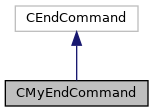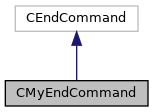Provides an end command to override the SBS one.
More...
#include <CMyEndCommand.h>
|
| struct | EndEvent |
| | Struct encapsulating the command and Tcl event to end the run. More...
|
| |
Provides an end command to override the SBS one.
◆ CMyEndCommand()
| CMyEndCommand::CMyEndCommand |
( |
CTCLInterpreter & |
interp, |
|
|
CMyEventSegment * |
pSeg, |
|
|
CExperiment * |
pExp |
|
) |
| |
Constructor.
- Parameters
-
| interp | Reference to interpreter. |
| pSeg | Pointer to the event segment to manipulate. |
| pExp | Pointer to the experiment we're reading data from. |
◆ ~CMyEndCommand()
| CMyEndCommand::~CMyEndCommand |
( |
| ) |
|
◆ endRun()
| int CMyEndCommand::endRun |
( |
| ) |
|
◆ handleEndRun()
| int CMyEndCommand::handleEndRun |
( |
Tcl_Event * |
pEvt, |
|
|
int |
flags |
|
) |
| |
|
staticprotected |
Calls the command's endRun function.
◆ handleReadOutRemainingData()
| int CMyEndCommand::handleReadOutRemainingData |
( |
Tcl_Event * |
pEvt, |
|
|
int |
flags |
|
) |
| |
|
staticprotected |
Calls the command's readOutRemainingData function.
◆ operator()()
| int CMyEndCommand::operator() |
( |
CTCLInterpreter & |
interp, |
|
|
std::vector< CTCLObject > & |
objv |
|
) |
| |
|
virtual |
Overridden CEndCommand function call operator to be sure that our end run gets called at the right time. If an end run operation is permitted, attempt to read out the remaining data and end the run.
◆ readOutRemainingData()
| int CMyEndCommand::readOutRemainingData |
( |
| ) |
|
After reading out the last of the data, write the run statistics to an end-of-run scalers file.
◆ rescheduleEndRead()
| void CMyEndCommand::rescheduleEndRead |
( |
| ) |
|
◆ rescheduleEndTransition()
| void CMyEndCommand::rescheduleEndTransition |
( |
| ) |
|
◆ transitionToInactive()
| int CMyEndCommand::transitionToInactive |
( |
| ) |
|
Stop run in the director module (module #0) – a SYNC interrupt should be generated to stop the run in all modules simultaneously when running synchronously. We are not running synchronously when in INFINITY_CLOCK mode. If the INFINITY_CLOCK mode is set, we must stop the run in each module individually.
- Note
- If the end run signal is successfully communicated to the module(s), the transition to an inactive state cannot fail, only report which module(s) failed to properly end their run. One common cause of this failure is a very high input rate to one or more channels on that module.
The documentation for this class was generated from the following files:

